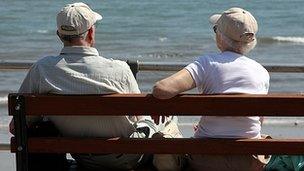Retire later to stop loneliness, says No 10 adviser
- Published

There is a clear connection between social interaction and wellbeing, studies suggest
People who carry on working in some capacity beyond their retirement could live longer, because they are not so lonely, a No 10 adviser has suggested.
David Halpern said a lack of social interaction was "much worse" for elderly people in terms of its effect on their mortality than smoking.
Mr Halpern is director of Downing Street's behavioural "nudge unit".
It advises government on ways to encourage people to change behaviour, without using compulsion.
The approach is based on a school of thought that "nudging" people in a certain direction is more productive and cost-effective than trying to change behaviour by banning things or passing regulation.
It has been championed by Steve Hilton, one of Prime Minister David Cameron's closest aides and strategic thinkers, who helped establish a "behavioural insights team" at No 10 after the 2010 general election.
'Work matters'
Mr Halpern, an academic who is a specialist on health and social activity, made the remarks on Thursday at a summit in Sweden, involving Nordic and Baltic leaders and Mr Cameron.
Asked how governments could encourage older people to remain active, Mr Halpern pointed to research, external showing a link between social interaction and increased longevity.
Most over-75s felt lonely "all or most of the time", he said, and different forms of activity could help ease this.
"Work matters, particularly for older people, not just for money but absolutely for social contact."
He added: "We know smoking is really bad for you. But much worse are things like social relationships.
"If you have got someone who loves you, someone you can talk to if you have got a problem, that is a more powerful predictor of whether you will be alive in 10 years' time, more than almost any other factor, certainly more than smoking."
Employers cannot lawfully discriminate on the grounds of age.
But campaigners say there is often an unconscious bias against older people in the workplace which makes it hard for them to find employment, particularly in the tough economic climate.
Ministers plan to raise the state pension age to 67 for men and women by 2026 - eight years earlier than planned - a move designed to save money and reflect growing life expectancy.
'Enough houses'
A Cabinet Office spokeswoman said Mr Halpern was not making specific policy suggestions but simply emphasising the "clear connection" between social relationships and physical and mental wellbeing.
"He is not calling for all old people to go out and work," she said, adding that keeping active could include volunteering, helping in the community and providing one-to-one support as well as paid work.
Officials also denied Mr Halpern was urging elderly people to down size after he told the conference that "we do have enough houses... it is just essentially they are lived in by older people".
Housing minister Grant Shapps said last month that councils should help elderly people move into smaller homes where appropriate so their properties could be rented to young, larger, families.
The Cabinet Office said that although older people could sometimes feel isolated in large homes, the issue should be a matter of individual choice and flexibility.
- Published8 February 2012
- Published17 January 2012